CORPORATE ACTION: AmorePacific
Amorepacific Signs MOU With Hansol Paper To Make Environment-Friendly Packaging
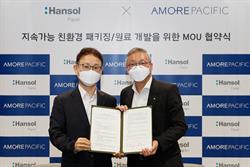
Amorepacific has signed a memorandum of understanding with Hansol Paper to develop environment-friendly materials for cosmetic packaging. The companies also agreed to speed up efforts to develop 100% biodegradable containers. Earlier, Amorepacific announced it has developed a technology for manufacturing paper containers that remove about 70% of plastic used in packaging.[Image Credit: © Amorepacific ]
CORPORATE ACTION: Colgate
Palmolive’s Relaunched Ultra Dishwashing Soap Comes In 100% Post-Consumer Recycled Plastic Bottles
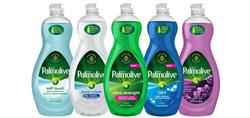 Palmolive has relaunched its Palmolive Ultra dishwashing detergent in bottles made with 100%post-consumer recycled plastic. This will keep an estimated 5,200 tons of plastic from reaching landfills in the United States and Canada. Palmolive Ultra dish soap is formulated with 100% biodegradable cleaning ingredients.[Image Credit: © Colgate-Palmolive]
Palmolive has relaunched its Palmolive Ultra dishwashing detergent in bottles made with 100%post-consumer recycled plastic. This will keep an estimated 5,200 tons of plastic from reaching landfills in the United States and Canada. Palmolive Ultra dish soap is formulated with 100% biodegradable cleaning ingredients.[Image Credit: © Colgate-Palmolive]
CORPORATE ACTION: Henkel
Henkel, Plastic Bank Open First Collection Centers in Egypt
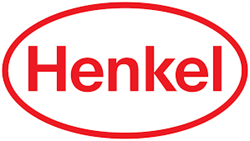 Henkel and Plastic Bank have opened their first three collection centers for plastic waste in Cairo, Egypt and aim to achieve an annual collection capacity of 5,000 tons of plastic waste by 2023. People can exchange collected plastic waste for money at the collection centers,preventing the waste entering rivers and oceans. The project also aims to help the local population by improving the living condition of collector communities.[Image Credit: © Henkel]
Henkel and Plastic Bank have opened their first three collection centers for plastic waste in Cairo, Egypt and aim to achieve an annual collection capacity of 5,000 tons of plastic waste by 2023. People can exchange collected plastic waste for money at the collection centers,preventing the waste entering rivers and oceans. The project also aims to help the local population by improving the living condition of collector communities.[Image Credit: © Henkel]
Authentic Beauty Concept Partners With Green Salon Collective To Help Hairdressers Contribute To Circular Economy
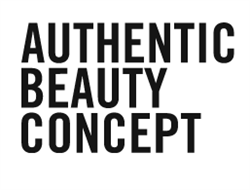 Henkel’s vegan professional haircare brand, Authentic Beauty Concept, has collaborated with Green Salon Collective to help promote sustainability among hair salons in the UK and Ireland. Green Salon Collective cooperates with salons in the countries to collect and recycle hair, as well as coloring products, bleach, foils, and related products to help ensure they contribute to creating a circular economy. The Authentic Beauty Concept team will partner with GSC to help hairdressers implement recycling bins and pick-up services, and to promote education and accreditation.[Image Credit: © Authentic Beauty Concept]
Henkel’s vegan professional haircare brand, Authentic Beauty Concept, has collaborated with Green Salon Collective to help promote sustainability among hair salons in the UK and Ireland. Green Salon Collective cooperates with salons in the countries to collect and recycle hair, as well as coloring products, bleach, foils, and related products to help ensure they contribute to creating a circular economy. The Authentic Beauty Concept team will partner with GSC to help hairdressers implement recycling bins and pick-up services, and to promote education and accreditation.[Image Credit: © Authentic Beauty Concept]
CORPORATE ACTION: Procter & Gamble
P&G Launches Campaign Encouraging Consumers To Make Sustainable Choices
 Procter & Gamble is launching a new campaign aimed at highlighting how ordinary households and consumer actions can help save and protect the planet. Also, the company’s different brands are helping promote sustainability and developing product formulation and packaging that are environment friendly. Among the sustainable choices the company is reminding consumers about include washing their laundry with cold water, refraining from using the dishwasher’s pre-rinse feature, and using shaving and skincare products that are both skin- and environment friendly.[Image Credit: © Procter & Gamble]
Procter & Gamble is launching a new campaign aimed at highlighting how ordinary households and consumer actions can help save and protect the planet. Also, the company’s different brands are helping promote sustainability and developing product formulation and packaging that are environment friendly. Among the sustainable choices the company is reminding consumers about include washing their laundry with cold water, refraining from using the dishwasher’s pre-rinse feature, and using shaving and skincare products that are both skin- and environment friendly.[Image Credit: © Procter & Gamble]
Tide Seeks To Halve Use Of Virgin Plastic In Packaging By 2030
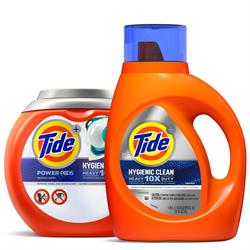
Procter & Gamble’s Tide laundry care brand has announced its 2030 Ambition sustainability and corporate social responsibility goals. The brand’s strategies for reducing its overall carbon footprint by 2030 include reducing its use of virgin plastic in packaging by half from 2020 levels. Tide has committed to using 100% recyclable packaging for all its products by 2030. Other features include reducing further its greenhouse gas emissions and promoting cold water washing to help reduce energy use for laundry.[Image Credit: © Procter & Gamble]
CORPORATE ACTION: Unilever
Unilever Packaging Director Aims To See New Circular Economy Technologies At Virtual Summit

Unilever global foods packaging director, Hugo Menilo, said he hopes that the 2021 Rethinking Materials virtual summit will help him learn about new technology alternatives that can push the circular economy forward. He said he also wants to work with potential partners who will collaborate with Unilever in making packaging a sustainable element of the consumer experience. As one of the featured speakers, he hopes to share Unilever’s vision for circular packaging.[Image Credit: © Hugo Menilo]
Unilever Partners With Liverpool And Oxford Universities To Push Sustainable Manufacture Of Consumer Products
 Unilever in the UK has joined forces with the University of Liverpool and the University of Oxford to help promote sustainable manufacture of and packaging for consumer products in the UK. The £8.8million EPSRC Prosperity Partnership will work to reduce the carbon footprint of consumer products, including shampoo and laundry detergent, by developing environment-friendly production of chemicals used in consumer products. The partnership also aims to help the country achieve Net Zero by 2050.[Image Credit: © Unilever plc]
Unilever in the UK has joined forces with the University of Liverpool and the University of Oxford to help promote sustainable manufacture of and packaging for consumer products in the UK. The £8.8million EPSRC Prosperity Partnership will work to reduce the carbon footprint of consumer products, including shampoo and laundry detergent, by developing environment-friendly production of chemicals used in consumer products. The partnership also aims to help the country achieve Net Zero by 2050.[Image Credit: © Unilever plc]
Italian Unilever Partners With Seri Plastic To Convert Factory Into Plastic Recycling Facility
 Unilever in Italy has partnered with Seri Industrial Group’s Seri Plastic unit to establish a jointly owned business that will recycle plastic waste based on EU circular economy models. Also, Seri Plastic will buy Unilever’s factory in the southern town of Pozzilli for the joint plastic recycling venture. The joint venture will invest 75 million euros in the recycling project and will retain all the employees currently working at the factory.[Image Credit: © SERI PLAST]
Unilever in Italy has partnered with Seri Industrial Group’s Seri Plastic unit to establish a jointly owned business that will recycle plastic waste based on EU circular economy models. Also, Seri Plastic will buy Unilever’s factory in the southern town of Pozzilli for the joint plastic recycling venture. The joint venture will invest 75 million euros in the recycling project and will retain all the employees currently working at the factory.[Image Credit: © SERI PLAST]
Unilever Creates Plastic Recycling Programs Uniquely Designed For Countries
.jpg&width=250&height=188) Unilever has developed country-specific action plans for collecting and recycling plastic packaging waste to deal with the different states of recycling infrastructure in countries where the company does business. The company also gets involved in direct investments and collaborations in waste collection and processing, building capacity by purchasing recycled plastics, and supporting expanded manufacturer responsibility programs by directly paying for the collection of the company’s packaging. For example, Unilever will collect and process more than 100% of the plastic packaging the company sells in 2021. Unilever Pakistan has collaborated with UNDP to ensure that Rahim Yar Khan will become a zero plastic waste city. Also, the company is working with other consumer goods companies, such as PepsiCo, Procter & Gamble, and Coca-Cola, to jointly pledge $100 million to the Circulate Capital Ocean Fund investment fund to prevent ocean plastic pollution.[Image Credit: © Unilever plc]
Unilever has developed country-specific action plans for collecting and recycling plastic packaging waste to deal with the different states of recycling infrastructure in countries where the company does business. The company also gets involved in direct investments and collaborations in waste collection and processing, building capacity by purchasing recycled plastics, and supporting expanded manufacturer responsibility programs by directly paying for the collection of the company’s packaging. For example, Unilever will collect and process more than 100% of the plastic packaging the company sells in 2021. Unilever Pakistan has collaborated with UNDP to ensure that Rahim Yar Khan will become a zero plastic waste city. Also, the company is working with other consumer goods companies, such as PepsiCo, Procter & Gamble, and Coca-Cola, to jointly pledge $100 million to the Circulate Capital Ocean Fund investment fund to prevent ocean plastic pollution.[Image Credit: © Unilever plc]
CORPORATE ACTION: Other
General Mills Adds Sustainability Metrics To Extended Revolving Credit Facility
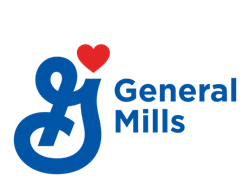
General Mills said it has renewed its five-year $2.7 billion revolving credit facility, extending it to 2026 and adding a pricing structure that is linked to the company’s sustainability performance. The company’s environmental impact metrics will be based on reducing greenhouse gas emission from its operations and using renewable electricity for its worldwide operations. General Mills’ banking partners include BofA Securities, JPMorgan Chase Bank, and Citibank.[Image Credit: © General Mills]
The Body Shop Plans To Expand Network Of Refill Stations Worldwide
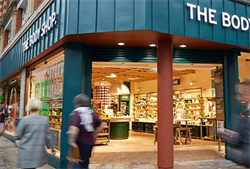 Beauty retailer The Body Shop will from April start offering refill stations for personal care products, including shower gels, liquid hand soap, shampoos, and conditioners, at 47 stores in France. This is part of the company’s plan to install 400 refill stations worldwide by the end of 2021. The 300ml recyclable aluminum bottle will cost €2.50 and the product refill €7. The Body Shop’s other efforts to reduce its environmental footprint include the expanded use of recycled plastic for packaging and use of natural ingredients in making “body butters” for skincare products.[Image Credit: © The Body Shop]
Beauty retailer The Body Shop will from April start offering refill stations for personal care products, including shower gels, liquid hand soap, shampoos, and conditioners, at 47 stores in France. This is part of the company’s plan to install 400 refill stations worldwide by the end of 2021. The 300ml recyclable aluminum bottle will cost €2.50 and the product refill €7. The Body Shop’s other efforts to reduce its environmental footprint include the expanded use of recycled plastic for packaging and use of natural ingredients in making “body butters” for skincare products.[Image Credit: © The Body Shop]
Keurig Dr. Pepper Adopts 100% Recycled Plastic Bottles For Beverages
 Keurig Dr. Pepper has completely changed the packaging of its Snapple brand of carbonated soft drinks and other beverages with new bottles made with 100% post-consumer recycled plastic. CEO Bob Gamgort said “it's 85% less material than our current packaging, so we save on shipping costs and it reduces our carbon footprint".[Image Credit: © Keurig Dr. Pepper]
Keurig Dr. Pepper has completely changed the packaging of its Snapple brand of carbonated soft drinks and other beverages with new bottles made with 100% post-consumer recycled plastic. CEO Bob Gamgort said “it's 85% less material than our current packaging, so we save on shipping costs and it reduces our carbon footprint".[Image Credit: © Keurig Dr. Pepper]
CAMPAIGNS, COMMITMENTS & NGOs
Ecosurety Executive Calls On UK Government To Provide Bioplastics Guidance
Canada Plastics Pact Welcomes 13 New Partners And Creates Advisory Council
 The Canada Plastics Pact announced 13 new partners, including Colgate-Palmolive Company, that support its campaign to reduce plastic waste and pollution in the country. The CPP also announced the formation of its first CPP Advisory Council, which includes representatives from a number of consumer goods suppliers and retailers, including Unilever and Walmart Canada.[Image Credit: © Canada Plastics Pact]
The Canada Plastics Pact announced 13 new partners, including Colgate-Palmolive Company, that support its campaign to reduce plastic waste and pollution in the country. The CPP also announced the formation of its first CPP Advisory Council, which includes representatives from a number of consumer goods suppliers and retailers, including Unilever and Walmart Canada.[Image Credit: © Canada Plastics Pact]
CONSUMER & PUBLIC OPINION
Innisfree Apologizes For Plastic Bottle Disguised As Paper Packaging
.png&width=250&height=203)
South Korean personal care brand Innisfree apologized after a customer discovered that the bottle packaging of its green-tea-infused moisturizer was made of plastic. The bottle came with a print that says, “Hello, I’m Paper Bottle”; however, the customer sliced the bottle open and discovered it was made of plastic and covered with a thin paper shell.[Image Credit: © Innisfree]
Report Reveals Few UK Adults Fully Understand Circular Economy
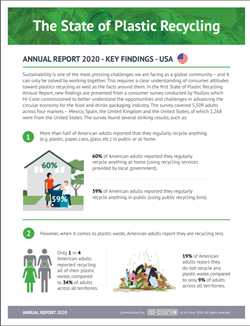
In the UK, 76% of respondent adults said they recycle 75% or more of their plastic waste. Packaging company Hi-Cone’s report (“State of Plastic Recycling”) based on data from a survey conducted by YouGov revealed that less than 25% of UK adults understand the term “circular economy”. Also, in the UK, 62% of respondents said there should be more recycling bins in public spaces, with 38% supporting the idea of more recycling centers. Among UK respondents, 61% said they already send waste materials for recycling through the post or are likely to do so in the future. The survey covered more than 5,000 adults across the United States, Mexico, Spain, and the UK.[Image Credit: © Hi Cone]
MARKET NEWS
Survey Highlights State And Future Prospects Of Plastics Recycling In The UK
 In the UK, collection of household plastics increased 2% to 560kt in 2019, according to the 2020 RECOUP UK Household Plastics Collection Survey report. Results of the survey revealed all 382 local authorities collect plastic bottles for recycling at the kerbside. The number of local authorities collecting plastic pots, tubs, and trays increased to 85%, but the number of authorities collecting films and flexibles declined to 14%. The survey also highlighted extensive inconsistencies, such as messages concerning whether to remove or keep lids on plastic bottles. Factors expected to affect recycling of plastics in the UK include the planned implementation of deposit return schemes across the country and rejection by foreign countries of recycling inferior quality materials.[Image Credit: © RECOUP]
In the UK, collection of household plastics increased 2% to 560kt in 2019, according to the 2020 RECOUP UK Household Plastics Collection Survey report. Results of the survey revealed all 382 local authorities collect plastic bottles for recycling at the kerbside. The number of local authorities collecting plastic pots, tubs, and trays increased to 85%, but the number of authorities collecting films and flexibles declined to 14%. The survey also highlighted extensive inconsistencies, such as messages concerning whether to remove or keep lids on plastic bottles. Factors expected to affect recycling of plastics in the UK include the planned implementation of deposit return schemes across the country and rejection by foreign countries of recycling inferior quality materials.[Image Credit: © RECOUP]
INNOVATION & TECHNOLOGY
Avantium Sees PEF Plastic As Future Universal Packaging For Food And Drink Industry
.png&width=250&height=164)
Avantium N.V. said polyethylene furanoate (PEF) plastic, which is made from plants, has the potential to become the standard packaging for the food and drink industry. The company also said it expects to produce 5,000 metric tonnes of FDCA, which is the key building block for PEF, by end of 2023 at its Delfzijl factory in the Netherlands.[Image Credit: © Avantium N.V.]
Siegwerk Joins Forces With Kotkamills To Create Sustainable Fiber-Based Printing For Packaging Applications
 Siegwerk and Kotkamills have agreed to collaborate in developing new technologies for fiber-based printing for packaging applications. Through their strategic partnership, the companies will come up with sustainable and environment-friendly packaging and labeling applications by combining their latest technologies. The collaboration will focus on potential applications of water-based dispersion barrier coated paperboard as a replacement for traditional polyethylene-coated paperboard.[Image Credit: © Kotkamills]
Siegwerk and Kotkamills have agreed to collaborate in developing new technologies for fiber-based printing for packaging applications. Through their strategic partnership, the companies will come up with sustainable and environment-friendly packaging and labeling applications by combining their latest technologies. The collaboration will focus on potential applications of water-based dispersion barrier coated paperboard as a replacement for traditional polyethylene-coated paperboard.[Image Credit: © Kotkamills]
EMERGING IDEAS, THEMES & TRENDS
Gelo Uses Other Brands’ Empty Bottles For Own Hand-Soap Refill Business
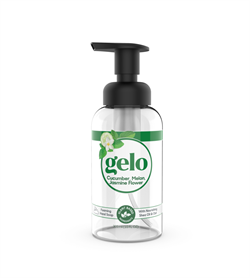
Gelo uses both own-brand soap bottles and empty bottles from other brands for its hand-soap refill business. While Gelo’s Soap Bottle Salvage refill kits are not part of a cross-brand marketing partnership with other brands, the marketing move has helped prevent competitors’ empty soap bottles from going to the landfill. Gelo made an initial run of approximately 800 Soap Bottle Salvage kits which produces 97% less packaging waste compared with single-use kits.[Image Credit: © Gelo Products. ]
MMC Claims Biodegradable Mushroom Packaging Will Replace Plastic Packaging
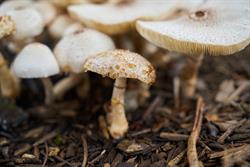 Magical Mushroom Company believes its mycelium-based biodegradable Mushroom Packaging will be the future of packaging. Its UK factory, opened in August 2020, can manufacture 1.2 million of sustainable trays per year. MMC plans to open a second plant in the country. The technology involves mixing mycelium with agricultural by-products, such as hemp, corn, and wood, to produce trays that are 100% biodegradable within 40 days and degrade in water within 180 days.[Image Credit: © Engin_Akyurt]
Magical Mushroom Company believes its mycelium-based biodegradable Mushroom Packaging will be the future of packaging. Its UK factory, opened in August 2020, can manufacture 1.2 million of sustainable trays per year. MMC plans to open a second plant in the country. The technology involves mixing mycelium with agricultural by-products, such as hemp, corn, and wood, to produce trays that are 100% biodegradable within 40 days and degrade in water within 180 days.[Image Credit: © Engin_Akyurt]
Copyright 2026 Business360, Inc.

